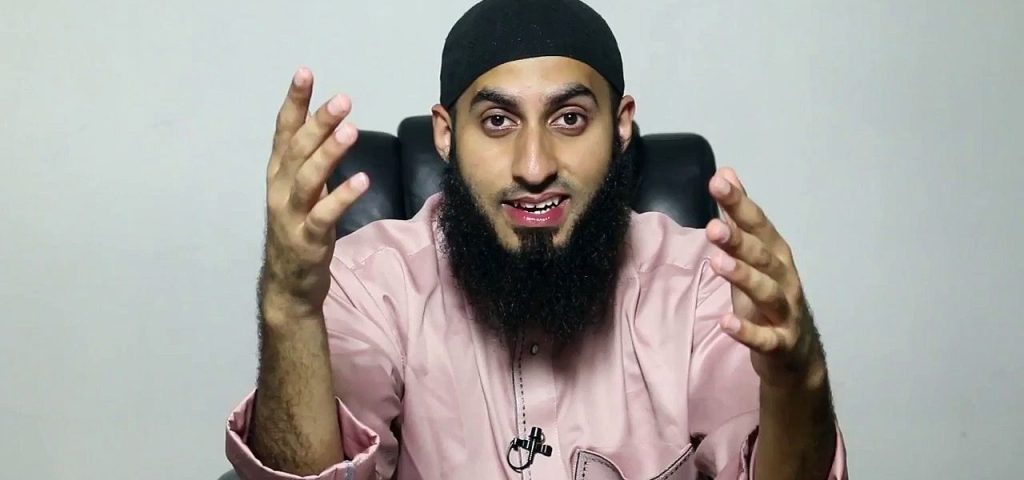HAIDER
ELITE MEMBER

- Joined
- May 21, 2006
- Messages
- 33,771
- Reaction score
- 14
- Country
- Location
The Taliban's Ideology Has Surprising Roots In British-Ruled India
Heard on Morning Edition

LAUREN FRAYER
FacebookInstagramTwitter
LISTEN· 6:526-Minute ListenAdd toPLAYLIST
- Download
- Embed
- Transcript

The main entrance to the campus of the Darul Uloom seminary in Deoband, India, where the Deobandi strain of Islam was founded in the 19th century. Among its more recent adherents are the Taliban.
Lauren Frayer/NPR
DEOBAND, India — Hundreds of young men in crisp white tunics and skullcaps sit cross-legged in classrooms ringed with porticoes, poring over Islamic texts. From a marble minaret above them, a dozen voices wail Quranic verse in unison.
They start and stop in rounds, echoing like a canon across an otherwise scruffy landscape of rickshaws, tea stalls and open sewers.
This is where the Taliban's ideology was founded. It's not Afghanistan; nor is it the Middle East. It's not even a Muslim-majority country. It's a small town in India about 100 miles north of the capital, New Delhi.
More than 150 years ago, this is where Muslim scholars started a seminary that also became entwined in the politics of that era. The Darul Uloom Deoband seminary, founded in 1866, taught that by returning to the core principles of Islam, Indian Muslims could resist British colonial rule. Less than a decade earlier, the British crown had taken control of India from the East India Company. The previous Mughal — Muslim — rulers had been vanquished.
"The British have taken over. The Muslim glory has faded away. So there comes a kind of state of despondency within the Muslims," says Luv Puri, a researcher, author and columnist. "Then they decide it's time to get back the glory of Islam. And let's start a movement."
The movement they started became known as Deobandi Islam. Adherents later joined Mahatma Gandhi's freedom struggle. After the partition of India, they fanned out across South Asia and set up seminaries, or madrassas, teaching an austere version of Islam — particularly along the Pakistan-Afghanistan border.
And that is where they educated their most infamous students: the Taliban.
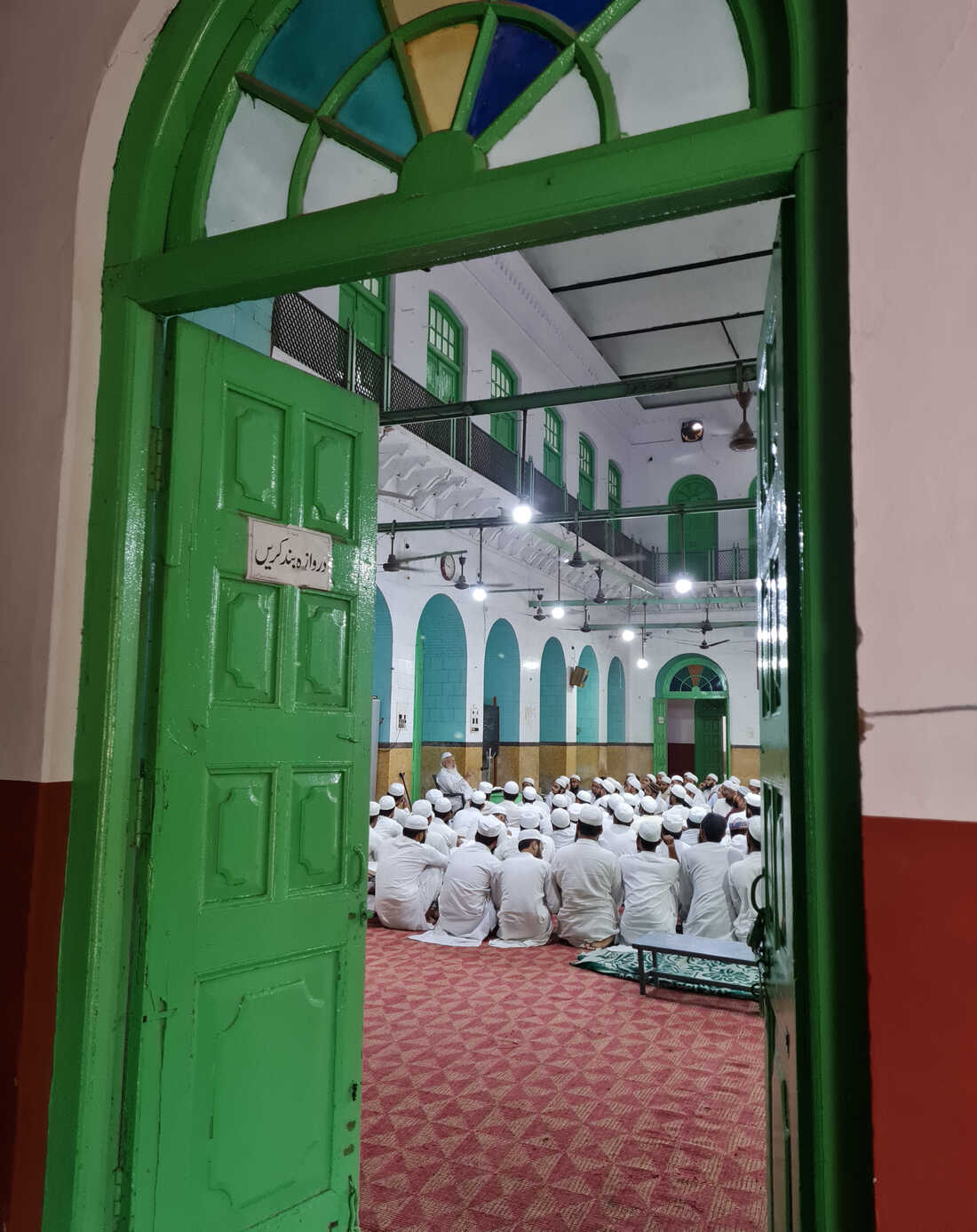
Classrooms on the campus of the Darul Uloom seminary in Deoband, India. This is where, in the 19th century, Muslim scholars founded the Deobandi school of Islam — which was later adopted by the Taliban.
Lauren Frayer/NPR
The Taliban's roots are actually in a Hindu-majority country
The late founder of the Taliban, Mullah Mohammad Omar, graduated from a Deobandi seminary in Pakistan, along with several other Taliban leaders. But while Afghanistan's new rulers call themselves Deobandis, clerics here in the birthplace of Deobandi Islam are keen to distance themselves from the Taliban — even if they occasionally speak admiringly of them."The Taliban say they are doing what we did in India. The way we kicked the British out of India, that's what the Taliban are doing in Afghanistan. They're kicking out outsiders: first the Russians, then the Americans," Maulana Arshad Madani, the 80-year-old principal of Darul Uloom, told NPR at his residence just outside the walled seminary's ornate brick gates. "What they say is right."
But Madani — and everyone else NPR met in Deoband — denied any contact with the Taliban and seemed uncomfortable with any association with them.
"They call themselves Deobandi, but 99% of the Taliban have never even visited India. We have no connection to them," Madani says. "The Taliban say our guiding idea — of not being enslaved by anyone — that comes from a Deobandi scholar who had gone [to Pakistan and Afghanistan]. Apart from that, there is no connection."
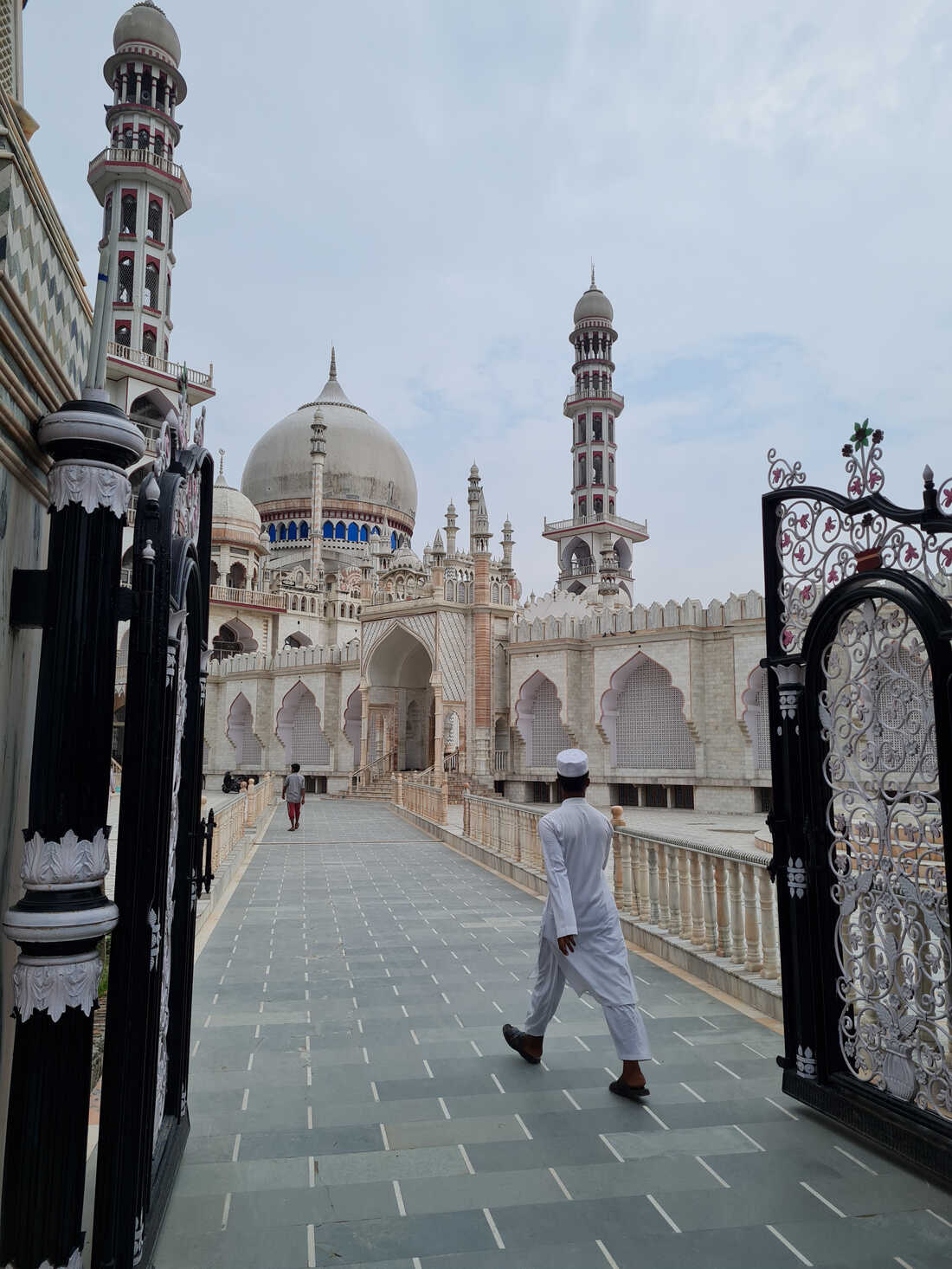
A mosque on the campus of the Darul Uloom seminary in Deoband, India.
Lauren Frayer/NPR
Scholars say he's right — that the Taliban's version of Islam diverged from the original Deobandi movement in the latter years of the 20th century.
"The Indian Deobandi [version] is classical, whereas the one in Pakistan and Afghanistan is neo-Deobandi," explains Soumya Awasthi, a security expert at the Vivekananda International Foundation, a think tank in New Delhi. "I call it 'neo-Deobandi' because it's walking away from the true tenets of Deobandi Islam. It has a strain of Wahhabism in it," she says.
Wahhabism is another ultraconservative movement within Sunni Islam, named for the 18th-century Saudi theologian Muhammad ibn Abdul Wahhab. It's the version of Islam enshrined in Saudi law and practiced there today.
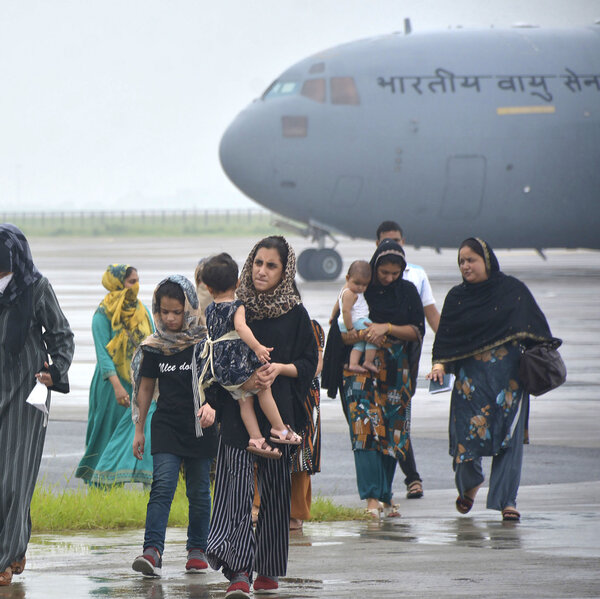
WORLD
With The U.S. Exit From Afghanistan, India Fears An Increasingly Hostile Region
"After the Iranian revolution in 1979, Saudi Arabia was worried that the Muslim world would be dominated by a Shia country — Iran. So they started funding [Sunni-majority] Pakistan to run these madrassas on their [Afghan] border," Awasthi says. "Slowly the Wahhabi culture came into Deobandi Islam."Wahhabi influence grew in Pakistan and Afghanistan throughout the 1980s, when the CIA and Saudi Arabia both funneled arms to mujahedeen guerrilla groups fighting the Soviet occupation of Afghanistan, during the Cold War.
Over time, different strains of Deobandi Islam were influenced by the different politics of the countries in which they flourished: the Wahhabi-infused strain, practiced by the Taliban, whose adherents have attacked more moderate Muslims and people of other faiths, and the original Deobandi strain, which has existed overwhelmingly peacefully in India for more than 150 years.
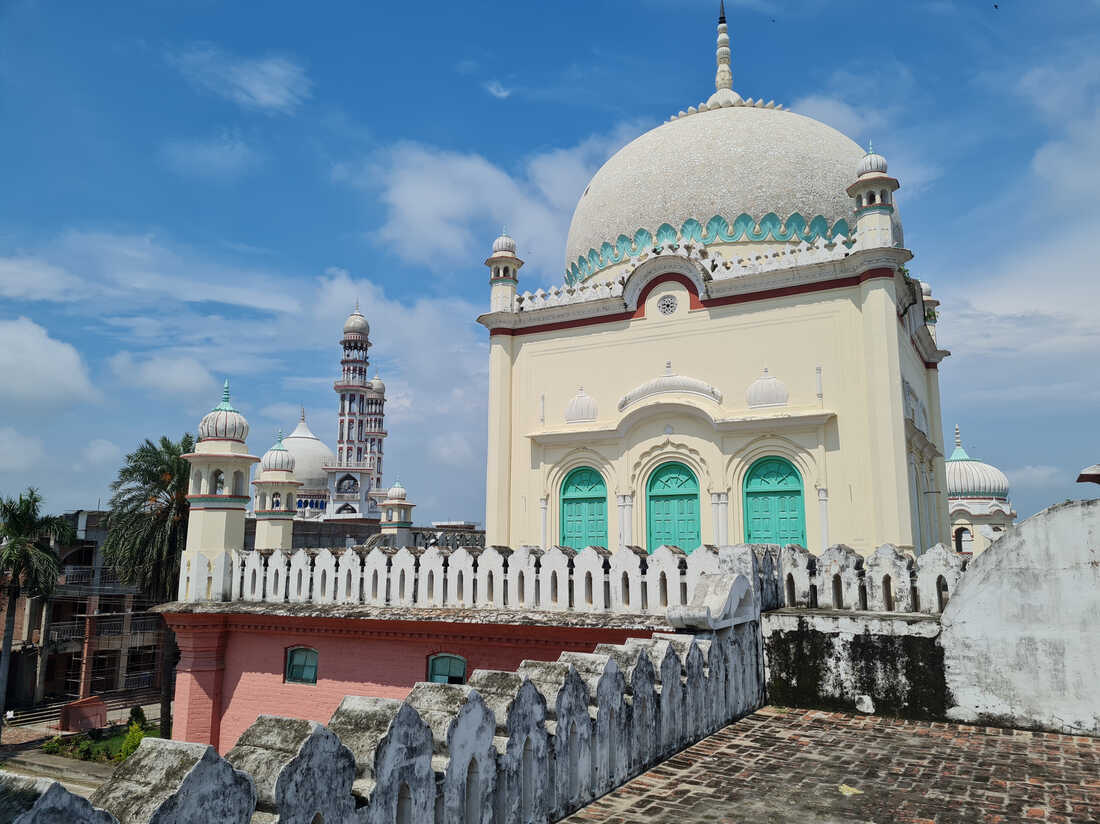
Buildings on the campus of the Darul Uloom seminary in Deoband, India.
Lauren Frayer/NPR
What Deobandi seminaries teach today
These days, the Darul Uloom Deoband seminary has more than 4,000 students — all men. They're mostly from India, but there are some foreign students from Muslim-majority countries, including Malaysia and Indonesia, though coronavirus travel restrictions have recently made their enrollment difficult. (And while thousands of Afghan students study in India's secular universities, since 2001 Indian authorities have granted very few, if any, visas to Afghan students wishing to study in Deoband.)The curriculum focuses on the Quran, texts about the life of the Prophet Muhammad and sayings attributed to him, Arabic language and literature, and Islamic law, as well as geography and history. Students follow an eight-year course of study, in Arabic, after which they can go on to postgraduate studies for master's degrees in theology, literature and other topics.
"Like all madrassas, these schools are, first and foremost, institutions of higher Islamic learning," Brannon Ingram, an expert on Deobandi Islam and an associate professor of religious studies at Northwestern University in Illinois, wrote in an email to NPR. "Some [also] teach courses in English and modern professional subjects. They do not 'teach' jihad, even though classical texts that students read will inevitably deal with that subject."
On campus, it looks like any other university: Students roam in packs, from dormitories to the dining hall. There's a massive new library. There are even bells between classes, though they're rung by hand, with a hammer, on a massive gong hanging in a courtyard.
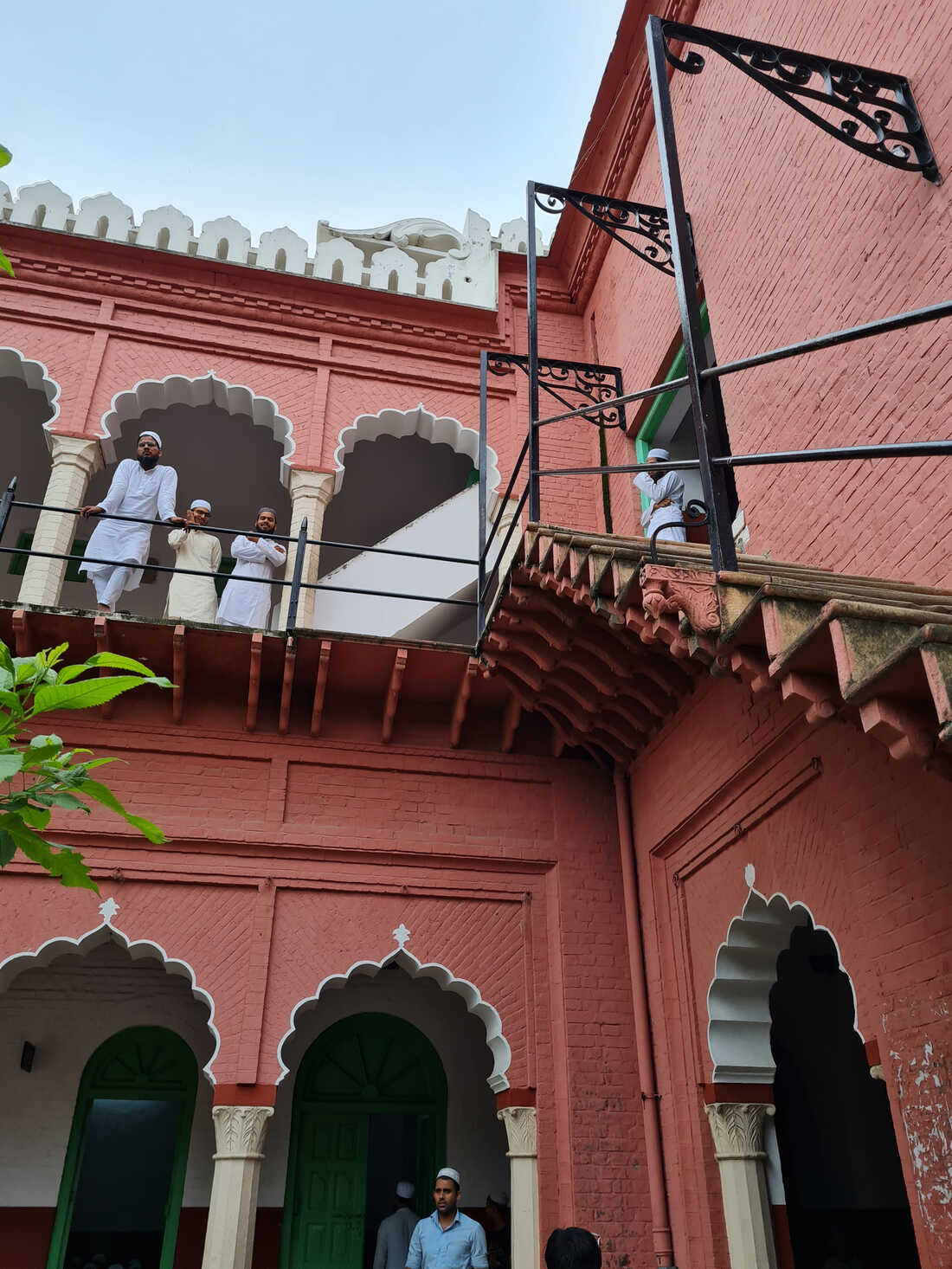
Students mill around between classes at the Darul Uloom seminary. In the 19th century, this seminary founded the Deobandi school of Islam.
Lauren Frayer/NPR
Some typical teenage hobbies are absent, however.
"Music is haram [forbidden] in Islam, so I don't like it," says a 24-year-old student named Aman Azeem. (There are some traditions of devotional music in Islam, and Islamic scholars are divided over which types of music should be allowed. Some ultraconservative sects, including the Taliban, have sought to ban secular music while allowing Quranic recitations, even melodic ones.)
Azeem says he came to Deoband seeking a purer form of Islam than the one he grew up with in New Delhi, where there are many Muslim sects.
In a discussion forum on the seminary's website, administrators quote from a fatwa, or an Islamic legal opinion, that calls it "absolutely undesirable for women to drive a car or bike." In another forum, a Muslim woman writes to the seminary's board asking for advice about whether she's allowed, under Islamic rules, to pluck her eyebrows. Administrators reply that it's "unlawful," saying the Prophet Muhammad "has cursed the women who remove their face hairs."
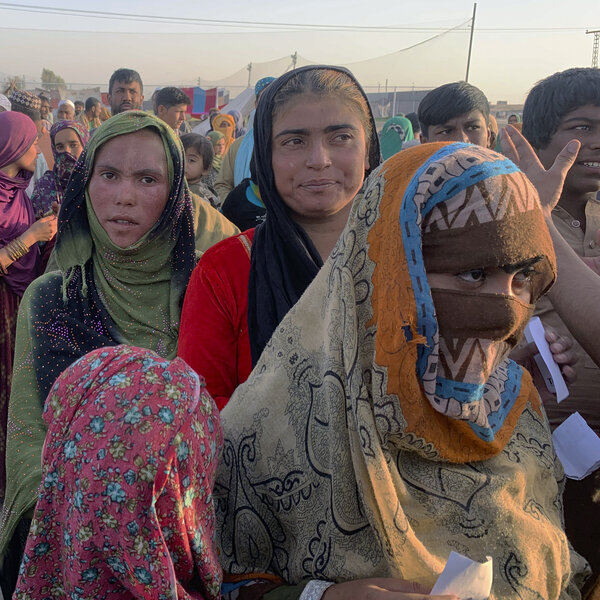
ASIA
At-Risk Afghans Urgently Look For A Way Out: 'The Taliban Are Seeking Us'
Some Deobandi policies may appear to have a lot in common with Wahhabi ones, Ingram says. "They certainly strike the average person as being 'purist' or even 'puritanical,' " he explains. "But there are far more differences than there are similarities between the two. Probably the most significant difference is that Wahhabis have mostly rejected Sufism [a mystical form of Islam] outright, whereas Deobandis have embraced Sufism, even regarding it as an essential part of how one becomes a pious, observant Muslim."At Darul Uloom, tuition is free. The seminary does not accept state funding, and all its money comes from donations.
"The fundraising takes place with ordinary Muslims — the plebeian class — and they take pride in that. It's grassroots. It has that class appeal even now," says Puri, the researcher and author, who has studied and written about India's Deobandi community.
Many Deoband graduates go on to run their own mosques or madrassas, but some also take up secular professions such as doctors, lawyers or businessmen. At least one is a member of India's parliament. Others have joined the civil service.
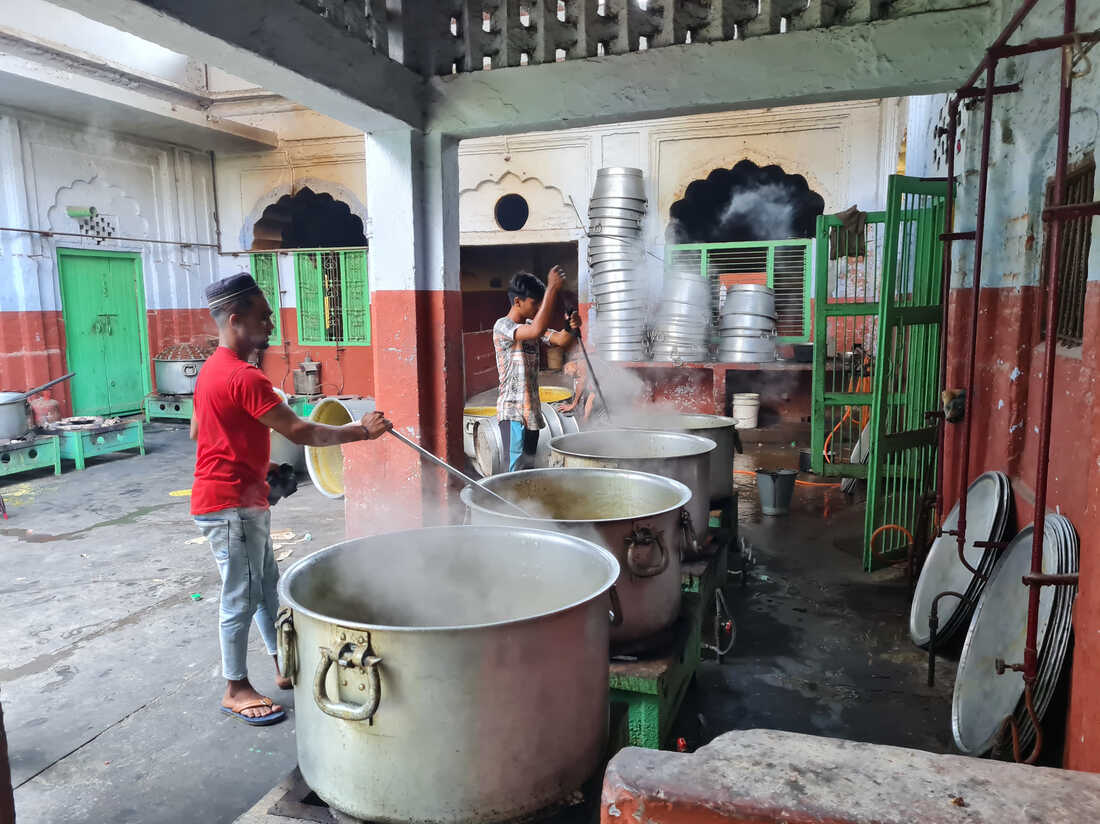
A kitchen and bakery in the student dining hall on the campus of the Darul Uloom seminary in Deoband, India.
Lauren Frayer/NPR
Fears that any association with the Taliban could put India's Muslims in danger
Despite their contemporary differences, the Taliban's association with Deoband makes many Muslims in India nervous.They are already beleaguered. India is currently ruled by a Hindu nationalist party that has been accused of discriminating and stoking violence against Muslims. In recent years, there has been an uptick in attacks on India's minorities, especially Muslims.
Just around the corner from the Darul Uloom seminary, tucked away behind an unpaved courtyard, is an unmarked office that's being used by a Hindu extremist group. Inside sits a local leader wearing an orange saffron scarf and bearing a tilak — a traditional Hindu streak of red paste marked on his forehead.
"Darul Uloom should be shut, and the Islamic scholars there should be investigated. That is what I'm demanding from the government," says Vikas Tyagi, a local official from Bajrang Dal, a Hindu organization that lobbies for the protection of cows (considered holy in Hinduism), the prevention of Hindu-Muslim marriage and the expulsion from India of Christian missionaries. It has also launched national campaigns to raise awareness of Islamist terrorism. And the group's members have been arrested in connection to attacks on Indian Muslims.
For years, Tyagi has been writing letters to the Indian government, demanding Darul Uloom's closure. He's also lobbying to change the name of Deoband, his hometown, to Devvrand — a word from Hindu scripture.
This year, the government said it would open an anti-terrorism center in Deoband. An aide to the surrounding state's chief minister, who is a Hindu priest, falsely cited the area's links to "Taliban savagery" as the reason for the new center, which has yet to be built.
For Tyagi, the mere suggestion of any Taliban link reinforces his long-held suspicions about his Muslim neighbors.
"This [anti-terrorism] center should keep a close watch on Darul Uloom. Those there who are conspiring against the country should be kept in check," he told NPR in an interview at his office.
How India's Muslims have largely escaped radicalization
An anti-terrorism center in Deoband may not be necessary, though. Because while Islamist radicals have attacked India, most of them have come from outside the country. Very few have been from the local Deobandi community."More or less, they have escaped any wave of [Islamist] radicalization. There may have been one or two incidents, but it's not rampant. It's much more disciplined," says researcher Puri. "There's a lot of caution, how these seminaries are run. Definitely they have been law-abiding citizens of India."
Hindu-majority India is home to nearly 200 million Muslims — one of the largest Muslim populations in the world. It's a testament to India's pluralism and democracy that so few of them have been radicalized, Puri says. "It's a real success story that's little discussed," he says.
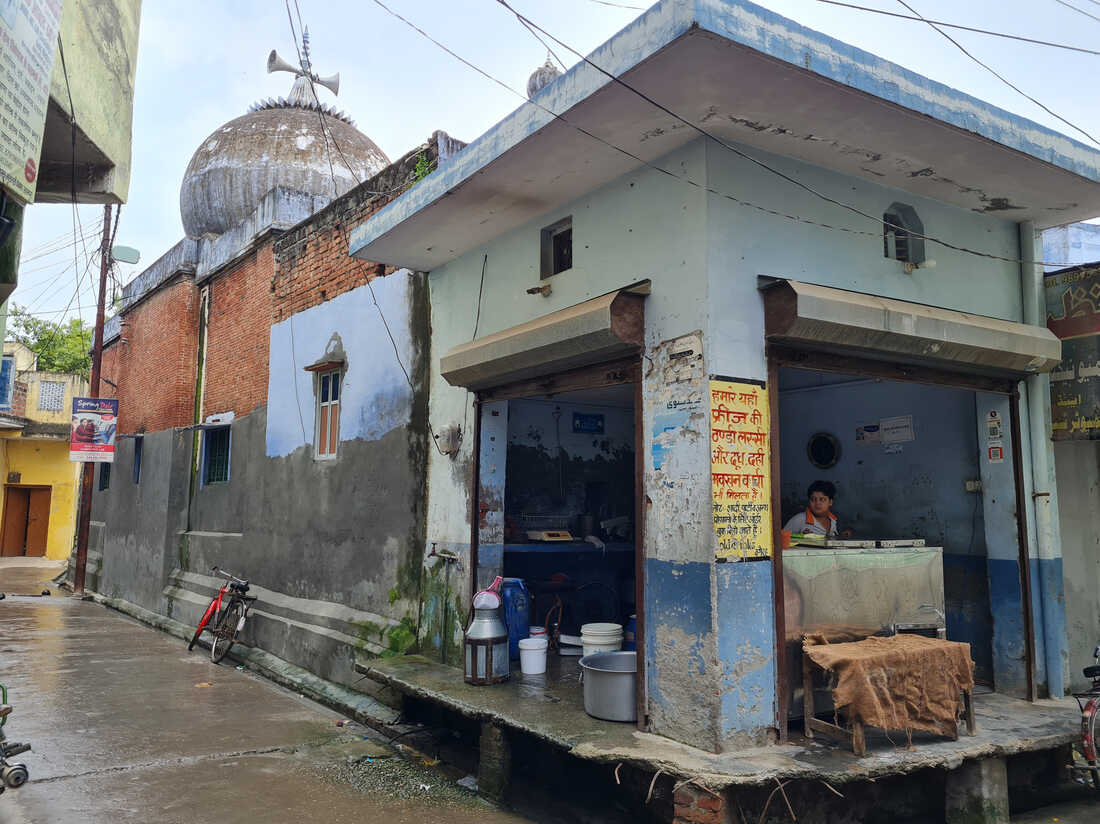
Tea stalls in a market outside the gates of the Darul Uloom seminary in Deoband, India.
Lauren Frayer/NPR
Of the few Indians who have joined radical Islamist groups, most are believed to have done so abroad, in Gulf countries, for example. In 2016, a group of Indians from the southern state of Kerala volunteered to fight for the Islamic State group. But some of them were Hindu and Christian converts to Islam. Some of them were radicalized abroad, and others in Kerala — more than 1,600 miles from the Darul Uloom seminary in Deoband.
Instead of being a threat to India's security, Puri and other analysts say India's Deobandi Muslims could possibly even help negotiate with the Taliban.
Interlocutors to the Taliban?

WORLD
With The U.S. Exit From Afghanistan, India Fears An Increasingly Hostile Region
Alongside the United States, India also spent the past 20 years trying to build democracy in Afghanistan. It spent $3 billion building Afghan roads, girls' schools and clinics. Indian and Afghan officials both say they want to salvage those investments. And India is worried about the presence of Pakistani militants in Afghanistan, who've attacked India before.For all those reasons, India has an interest in Afghanistan's future security. Indian diplomats are believed to have established back channels of communication with the Taliban several months ago, though India only just last month confirmed direct talks with the group in Doha, Qatar.
Awasthi, the security expert, says why not include Deobandi scholars from India in those talks?
"We must use our religious leaders to interact. We can play a positive role in pacifying the Taliban," she says. "We can help them change their syllabus. We can help them with better understanding of religious texts."
The Taliban might not listen to the U.S. or other outsiders. But scholars say they might possibly listen to a group of Muslim clerics in northern India with whom they share a history — albeit a distant one.
"I think we just missed the bus. Twenty years of investment, and we should have tried to leverage this original history we have with them, from a sleepy town 100 miles from Delhi," Puri says.
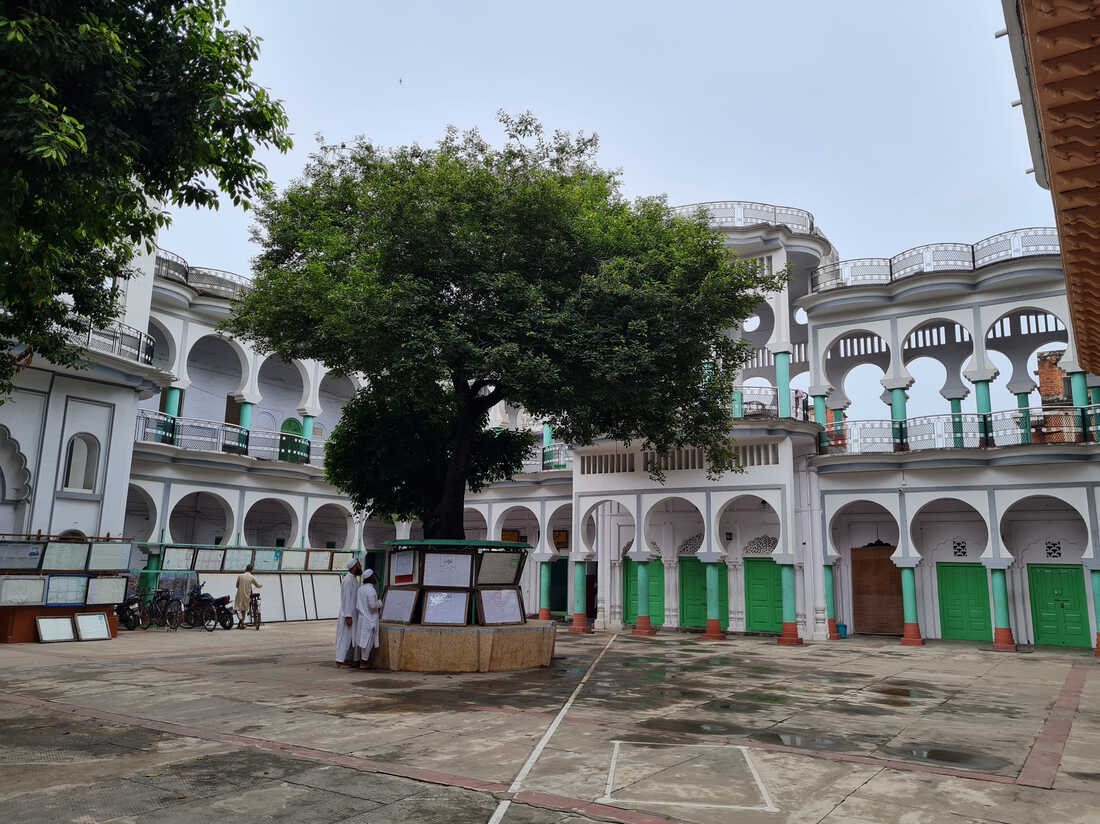
Buildings on the campus of the Darul Uloom seminary in Deoband, India.
Lauren Frayer/NPR
Maybe it's not too late.
Darul Uloom Deoband's principal, Madani, tells NPR he has never had any contact with the Taliban. But he's willing to start.
"I'm weak and old," says the 80-year-old cleric. "But if given the chance, I would go to Afghanistan."
If the Indian government asks him to, and if it's safe, he says he'd embark on a mission to Afghanistan, to urge the Taliban to be peaceful and just.
NPR producer Sushmita Pathak contributed to this story.







